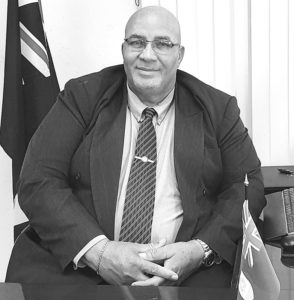
Fellow Anguillians and residents. For the first time, Security Firms in Anguilla are collaborating to hold the inaugural Security Awareness Week under the theme “Be Security Smart.”
I am pleased, in my capacity as Minister of Labour to have been invited to open the week of activities with an address.
There is no doubt that over the past years particularly most recently, we continue to see the growth and expansion of what I am happy to see are mostly locally owned and operated security firms.
I am also seeing increases in the requests for work permits for security officers.
So, for the next few minutes, permit me to share a few thoughts on what I consider to be the main duties and responsibilities of a security officer.
Security officers play a significant part in the daily safety of individuals, residences, businesses, organisations and institutions in Anguilla. They work in various settings, including schools, supermarkets, banks, hotels and other hospitality venues, utility companies and the hospital. They also support the Royal Anguilla Police Force in maintaining law and order at large crowd events including carnival, jams, fetes and parties.
A security officer is a person that maintains order and safety and protects buildings, valuable items and other property from theft, fire and other harmful situations.
Some security officers carry arms and specialise in cash transfers, fire safety and access or crowd control. They can work as private contractors that individuals or businesses hire for property protection or as a team to handle difficult situations.
Patrolling the premises
When patrolling the premises, the duty of a security officer is to be alert and ensure protection and safety on the property. Patrolling helps create a visible presence that can deter potential criminals or intruders. It includes checking for any signs of unauthorised entry or activity and reporting any issues to management. By patrolling the premises, security officers ensure that there are no intruders or acts of violence. They also make sure that there are no situations that can cause harm to someone through negligence or error. By regularly walking around the property, security officers can better understand what’s happening and respond accordingly.
Monitoring and controlling access to the premises
This includes screening people who enter to ensure that only individuals with authorisation have access to the premises. They also monitor activity in and around the area to make sure that everyone is behaving appropriately. A security officer gives a person access to the premises after they’ve provided their identification but only if they are expected. They’re also responsible for escorting people off the premises if they don’t have the authorisation to be there.
A security officer is responsible for responding to alarms and emergencies. This includes evacuating the building, contacting emergency services and providing first aid. Officers require training to manage emergencies and evaluate circumstances, such as changing weather patterns, external factors, criminal activity and threats, to ensure they’re ready for any situation.
Escorting visitors and staff
Security officers ensure that everyone is safe by escorting visitors and staff members to their destinations. Doing this can help deter crime by making sure that visitors and staff members can’t enter sensitive areas and confirming that security measures, such as doors or alarms, are secure. It also helps build trust, which can help security officers better protect everyone.
Generally, security officers should possess good communication skills, observation and surveillance skills, physical fitness, the ability to work under pressure and critical thinking and decision-making skills as well as first aid skills.
I trust that these observations will provide greater insight to security officers as they go through the various activities during this week and as they carry out their functions in the weeks and months ahead.
I wish you well. Stay safe. Thanks for listening.








